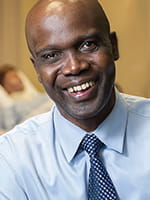Dr. Christopher Arori explains how his upbringing in Kenya influenced him to open a college for the fast-growing healthcare field in North Carolina.

Dr. Christopher Arori.
Photo credit:
Simin Griffiths.
He climbed in through the church window toting textbooks. He spent the entire sunlit day studying between empty pews. Only when the sky turned dark did he stop; there was no electricity in this building in the eastern Kenyan countryside.
The 14-year-old boy wasn’t a straight-A student, but when it came time to take an exam to determine which grade he would enter next, he set his mind on acing the test.
His score was so high that he skipped 10th and 11th grades, going straight into his final year at an advanced high school. After he graduated, he made a point to return to his rural village to tutor other children, often helping them prepare for exams late into the night.
He may not have known it then, but Dr. Christopher Arori ’11 would go on to design and open the Research Triangle College of Health Sciences and Technology in Morrisville, N.C., in 2013. The college, which offers nursing assistant, phlebotomy technician, electrocardiogram technician, and medical assistant programs, opened in July and graduated its first class in August.
A dedication to education clearly led Arori to this point in his career, but it takes a careful look at his professional background to discover exactly how he was able to pull off this extraordinary accomplishment.
In the 1980s, Arori worked as a teacher in rural Kenya before immigrating to the United States to study psychology at North Carolina Central University.
After he graduated, he worked as a faculty member, a nursing assistant, and, after earning his BSN, as a nurse. When Arori learned of a job in hospital management, he pivoted again to become the director of a small acute-care hospital in Durham, N.C. But all of these positions within the healthcare field—and the perspectives they provided—weren’t enough on their own, he says. He wanted to earn a Ph.D.
When Arori came across Walden, he was impressed by the rigor of the PhD in Public Health program, the professional experience of the teaching staff, and the residencies. Ultimately, his doctoral work led him back to Kenya, this time to collect, monitor, and analyze data on malaria.
But his mind kept returning to the same issue: Education helped him achieve his career goals. How would he help others do the same? “All the time I was thinking of positive social change,” he says. “I wanted to start something that would change people’s lives. My philosophy has always been that students can succeed. I made it my goal to start a college to assist low-income students.” He returned to North Carolina soon after and began the arduous task of researching and designing a college to connect students with careers in the fast-growing healthcare field.
Arori insists that opening the college, where he is the president, CEO, and a faculty member, is just the beginning of his work. His sights are set again on Kenya, where he would like to open a similar college. “Educating students is my calling,” he says.
Tell us about your career by emailing [email protected].



